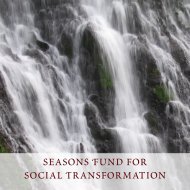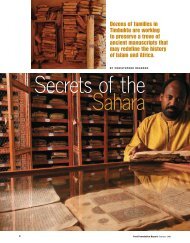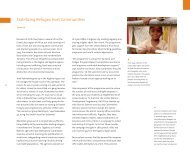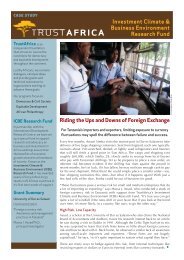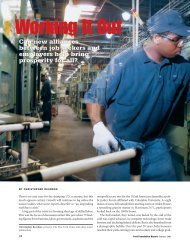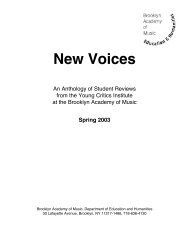The New Favela Beat - christopher reardon
The New Favela Beat - christopher reardon
The New Favela Beat - christopher reardon
Create successful ePaper yourself
Turn your PDF publications into a flip-book with our unique Google optimized e-Paper software.
Police officers from<br />
the 34th battalion’s<br />
percussion group have<br />
added drums to their<br />
crime-stopping arsenal.<br />
the tools of his trade: a two-way radio, handcuffs and a 9-millimeter<br />
service pistol. He never imagined that one day he’d add<br />
a bass drum or a can of spray paint.<br />
<strong>The</strong>n last year, local officials got wind of an idea from Rio:<br />
AfroReggae, a hip-hop group from Vigário Geral (a favela so<br />
notorious it’s known simply as V.G.), proposed a series of artist<br />
residencies to ease tensions between young people and the<br />
police. <strong>The</strong> project failed to gain traction in Rio, but the Secretariat<br />
of Social Defense in Minas Gerais state offered to bring<br />
it to Belo Horizonte.<br />
<strong>The</strong> 22nd and 34th battalions enlisted<br />
AfroReggae to lead four weeklong<br />
encounters designed to dispel stereotypes<br />
that divide police and favelados. Band<br />
members trained officers in drumming,<br />
dancing, graffiti, video and circus arts. At<br />
two concerts, slum residents mingled with<br />
hundreds of officers and their families.<br />
<strong>The</strong> workshops build on the “peace artists”programs of recent<br />
years, in which hundreds of officers coach soccer or give music<br />
lessons in the favelas. <strong>The</strong>y seek to drive a wedge between criminal<br />
gangs and the law-abiding majority.<br />
<strong>Beat</strong>o calls the AfroReggae workshops “one of the most interesting<br />
processes of police reform in Latin America.”<strong>The</strong>y help, he<br />
adds, by “changing the misperceptions that keep police officers<br />
and young people from the slums locked in a tense relationship.”<br />
<strong>The</strong> band formed in 1993 after police gunned down 21<br />
bystanders in Vigário Geral. Coming just weeks after police<br />
killed eight street children sleeping on the steps of a historic<br />
church, the incident made headlines worldwide. It inspired José<br />
Júnior, a young D.J. who made ends meet by driving a taxi, to<br />
‘<strong>The</strong> sound you heard before was<br />
the sound of guns. Now what you<br />
hear is music.’<br />
join friends in launching AfroReggae, a loose ensemble of percussionists,<br />
guitarists, turntablists and vocalists who write<br />
bouncy, popular songs about hope and survival.<br />
“We wanted to take V.G. out of the headlines about violence<br />
and put it in the culture section of the newspaper,” says Júnior.<br />
22 Ford Foundation Report Spring/Summer 2005



